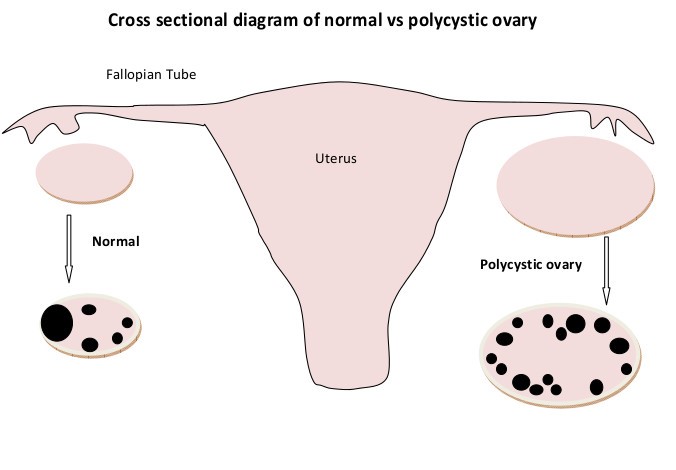What is PCOS?
PCOS occurs secondary to a hormone imbalance and affects 8-13% of reproductive age women. It may present with a diverse range of symptoms, commonly irregular periods, infertility or signs of excess androgen hormones as may be seen with acne, excess facial and body hair (hirsuitism).
How is PCOS Diagnosed?
It is diagnosed in an adult in the presence of two of the following features, after the exclusion of other causes:
- a polycystic appearance to the ovaries on ultrasound or an elevated anti-mullerian hormone level (AMH; as demonstrated in a blood test)
- irregular or absent periods, or lack of ovulation
- signs of androgen excess on either a blood test or as may be seen with acne, hirsuitism, and hair loss.
In an adolescent or a young women within 8 years of the start of menstruation (periods), neither the appearance of polycystic ovaries nor the use of anti-mullerian hormone are used in the diagnosis of PCOS. This is because the ovaries may contain > 20 follicles and the AMH may be elevated as part of normal pubertal development. If multiple follicles are seen on ultrasound in adolescent women, the ovaries are defined as multi-follicular and not polycystic.
If my ovaries have a polycystic appearance, does this mean I have PCOS?
No. It is important to realise if your ovaries are polycystic on ultrasound this is a way to describe the appearance of the ovaries and does not necessarily mean that you have PCOS. Whilst women with PCOS commonly have polycystic ovaries, women without PCOS can also have polycystic appearing ovaries.
What are the implications of PCOS?
Women with PCOS may have issues with fertility. Infertility in PCOS may occur secondary to the ovaries not releasing an egg each month (anovulatory infertility) and is generally managed by a specialist.
PCOS commonly results in menstrual irregularity or lack of periods, acne or hirsuitism.
Women with PCOS may also have an increased risk of developing insulin resistance, Type 2 diabetes, gestational diabetes during pregnancy, cardiovascular disease and sleep disorders. It may also be associated with depression, anxiety, eating disorders and impacts on body image.
Healthy lifestyle and prevention of excess weight gain are important for all women with PCOS.
There are multiple lifestyle and medical interventions that may assist women with PCOS, and these can be discussed with your family doctor or specialist.







